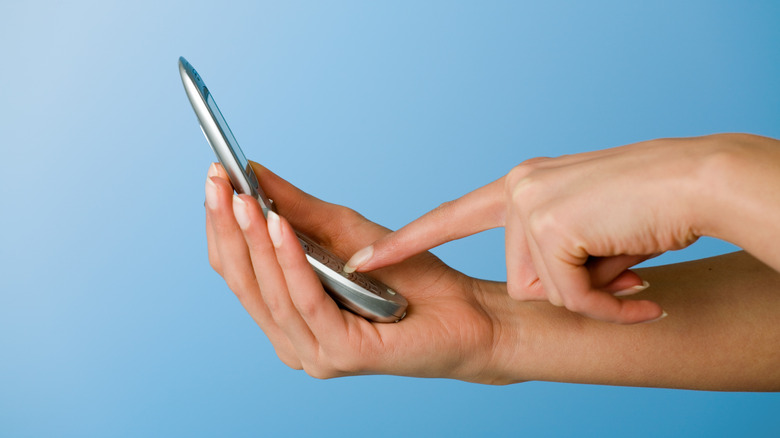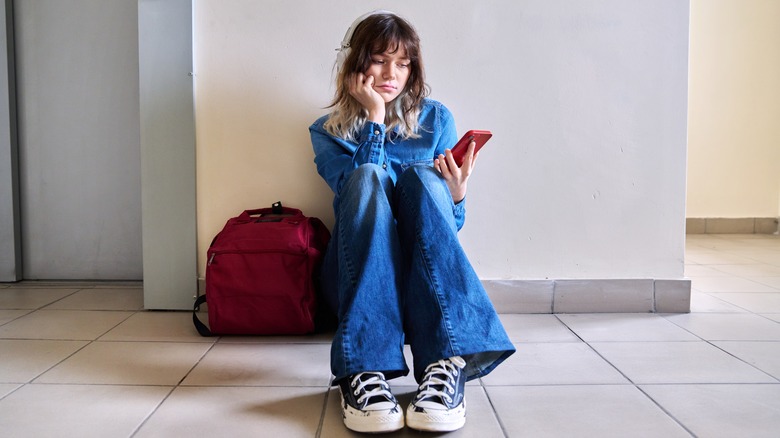The Flip Phone Comeback Is The Trend To Reset Your Emotional Well-Being In 2023
Just as the Y2K revival has taken over our closets, it may also influence our tech choices. The days of pixelated screens and typing on 3x4 keypads may seem like a thing of the past, but it could be time to give flip phones another chance. Flip phones first appeared in stores — and users' pockets — in 1989, per Insider, replacing the clunky models that came before. By the mid-2000s, everyone and their mom were toting around the sleek and shiny Motorola RAZR (or a similar style).
However, smartphones gradually became the norm after Apple launched the iPhone in 2007, and flip phones were suddenly seen as an uncool, outdated relic. But in recent years, certain people have been reclaiming old-school mobiles. According to a 2018 article in The Seattle Times, flip phones have become the device of choice for those taking a stance against the invasiveness of social media. By 2021, the shift away from smartphones had trickled down to Gen Z consumers, who began posting videos of their flip phones on TikTok (via Mashable).
Now, in 2023, the trend has fully gone mainstream. Celebrities like singer Camila Cabello have proudly joined the club, and the general public is participating too. CNN Business notes that while iPhones still reign supreme, the flip phone market is growing rapidly. The movement toward more basic cell phones could be just another "aesthetic" trend of the under-30 crowd. However, it might also offer crucial mental health benefits.
Flip phones make it easier to disconnect from distractions and drama
Gen Z may be turning their flip phones into the next fashion accessory, outfitting them with cute stickers and personalized backgrounds but, for many, the decision to ditch their smartphone is connected to their emotional well-being. Sammy Palazzolo, a college student and TikToker, explained in a recent viral video, "We don't take our regular phones out anymore because ... everything that leads to us having a bad time stems from our phone while we're out."
She believes that her flip phone "eliminates accidental drunk posts, eliminates drunk texts, eliminates bad hook-ups, it eliminates all the bad things about college and brings all the good things about a phone, which is connecting with people." Robin West, a 17-year-old, shared a similar experience with BBC News. "I didn't notice until I bought a brick phone how much a smartphone was taking over my life," she said.
West continued, "I had a lot of social media apps on it, and I didn't get as much work done as I was always on my phone." Moreover, even though smartphones are meant to keep people connected, research shows they may have the opposite effect. A 2019 study published in the Journal of Adolescent Health found an association between smartphone dependency and feelings of depression and loneliness, particularly in young people.
Is it time to give up your smartphone?
Modern cell phones have revolutionized how we depend on technology — but it's come at a cost, as Sandra Wachter, a senior research fellow in artificial intelligence at Oxford University, told BBC News. "One can reasonably say that nowadays a smartphone's ability to connect calls and send short messages is almost a side feature," she pointed out, adding that all the other functions and apps are constantly vying for your attention, making it impossible to ever be fully immersed in the present moment.
Moreover, "This can keep you on edge [and it] might even be agitating. It can be overwhelming." To combat this, you may want to make the switch to a simple flip phone that lacks notifications, dozens of distracting apps, and at-your-fingertips internet browsing. Going cold turkey on smartphone dependence might require more thoughtful planning, though. After all, you'll no longer be able to call for Siri when you have a question or rely on sophisticated digital maps and other features typically built into smartphones.
Still, the mental health benefits are clearly worth it. If you're apprehensive about parting ways with your smart device, start with small adjustments to your digital habits. A 2022 study published in the Journal of Experimental Psychology: Applied concluded that reducing smartphone use by just one hour a day can lead to long-lasting improvements to mental health and overall lifestyle.

